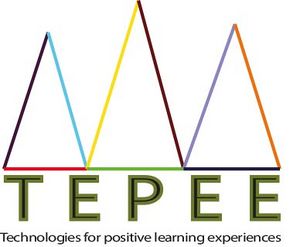« TEPEE » : différence entre les versions
Aucun résumé des modifications |
|||
| Ligne 1 : | Ligne 1 : | ||
[[Fichier:Tepee_A4_avec_texte.jpg|bordure|droite|sans_cadre|lien=https://edutechwiki.unige.ch/fr/Fichier:Tepee_A4_avec_texte.jpg]]''' | [[Fichier:Tepee_A4_avec_texte.jpg|bordure|droite|sans_cadre|lien=https://edutechwiki.unige.ch/fr/Fichier:Tepee_A4_avec_texte.jpg]]'''TEPEE''' (Technologies for Positive Learning Experiences) is a research group led by Pr. Gaëlle Molinari, and jointly associated with [https://tecfa.unige.ch/fr/ TECFA] (Faculty of Psychology and Educational Sciences, University of Geneva) and UniDistance. TEPEE is a follow-up to a special issue for the journal STICEF entitled “Positive technologies for learning” ([http://sticef.univ-lemans.fr/classement/speciaux.htm#technopo Molinari et al., 2021]). Positive technologies for learning is an emerging line of research in the field of educational technologies which draws on different fields: psychology of emotions and its research on the role of emotions in learning; positive psychology, which is concerned with the scientific study of conditions and factors that promote individuals’ well-being and the development of their full potential; and positive technologies that focuses on the design and use of digital technologies to support the optimal functioning of individuals, groups, and organizations. | ||
The TEPEE research is organized around two interdependent axes, one related to teaching (Axis 1) and the other to learning (Axis 2). In Axis 1, we are interested in the use of digital technologies by teachers in the classroom and how this can influence emotions, motivational beliefs and teacher well-being. Axis 2 is organized into two sub-themes. The first (Axis 2.1) is devoted to understanding how to enhance the student learning experience in hybrid or fully remote environments, including how to help students engage and persevere, cope with the pressure of self-regulation and fluctuations in emotions and motivation. The second (Axis 2.2) focuses on computer-supported collaborative learning (CSCL) and its emotional and motivational dimensions. The objective is to understand the complex role of emotions and their regulation in hybrid/remote collaborative learning environments, in particular how to help students become aware of the emotions felt during group work and how to use them to better collaborate. | |||
'''Les membres du groupe TEPEE''' | '''Les membres du groupe TEPEE''' | ||
| Ligne 13 : | Ligne 9 : | ||
===== Associate researchers ===== | ===== Associate researchers ===== | ||
* Sunny Avry | * Sunny Avry | ||
Research and teaching assistant | |||
* '''Djamileh Aminian''' (TECFA, MALTT). Le rôle de la confusion dans l'apprentissage / Role of confusion in learning. She is currently working on her master thesis on the role of confusion in online learning environment. The aim of this research is to understand how to help learners regulate confusion to foster deeper learning and engagement. Djamileh is also a professional digital learning consultant working with L&D teams to optimise the use of digital learning in the training of their employees. By joining TEPEE, she seeks to contribute to advance research on how to detect and address emotions in learning, how to adapt instructional design to take them into account and to use new findings in real-life settings. '''Keywords''': blended learning, epistemic emotions, engagement, digital learning. | |||
===== | ===== Predoctoral researcher ===== | ||
[[Fichier:Yannick Nleme 2022.jpg|alt=|vignette|150x150px|Yannick S. Nleme Ze]] | [[Fichier:Yannick Nleme 2022.jpg|alt=|vignette|150x150px|Yannick S. Nleme Ze]] | ||
* '''Yannick Stéphane Nleme Ze''' (<u>engagement in MOOC forums</u>). Yannick Stéphane Nleme Ze is a PhD student in Education Sciences at the TECFA Research Unit (University of Geneva) under the supervision of Prof. Gaëlle Molinari. He is also a Teaching and Research Assistant and organizes with Prof. Molinari, the Digital Learning and Distance Education course (ADID), and co-leads the Master of Science in Learning and Teaching Technologies (MALTT) theses. On the research side, Yannick Stéphane Nleme Ze has an interest in learner engagement in distance learning contexts, as well as in motivation to learn with ICT in both secondary and higher education. As part of his thesis, he is conducting research on learner engagement in MOOC discussion forums. His work aims to identify the dimensions, indicators and factors of engagement in MOOC discussion forums, design and validate a scale to measure this engagement and analyze the different levels of engagement observed between the structured and unstructured MOOC discussion forums. Before starting his thesis, Yannick Stéphane Nleme Ze worked for 10 years as a high school physics teacher. He holds a secondary and high school teacher's diploma from the higher teacher training college of Yaoundé (University of Yaoundé 1, Cameroon), a Master's degree in technological innovation (University of Angers, France), a Master's degree in educational technology (University of Montreal, Canada), and a University Research Diploma in digital education (University of Lille, France). '''Keys words:''' Engagement, motivation, distance learning, MOOC, discussion forums, ICT in education. '''Further information''': https://orcid.org/0000-0001-8212-678X | * '''Yannick Stéphane Nleme Ze''' (<u>engagement in MOOC forums</u>). Yannick Stéphane Nleme Ze is a PhD student in Education Sciences at the TECFA Research Unit (University of Geneva) under the supervision of Prof. Gaëlle Molinari. He is also a Teaching and Research Assistant and organizes with Prof. Molinari, the Digital Learning and Distance Education course (ADID), and co-leads the Master of Science in Learning and Teaching Technologies (MALTT) theses. On the research side, Yannick Stéphane Nleme Ze has an interest in learner engagement in distance learning contexts, as well as in motivation to learn with ICT in both secondary and higher education. As part of his thesis, he is conducting research on learner engagement in MOOC discussion forums. His work aims to identify the dimensions, indicators and factors of engagement in MOOC discussion forums, design and validate a scale to measure this engagement and analyze the different levels of engagement observed between the structured and unstructured MOOC discussion forums. Before starting his thesis, Yannick Stéphane Nleme Ze worked for 10 years as a high school physics teacher. He holds a secondary and high school teacher's diploma from the higher teacher training college of Yaoundé (University of Yaoundé 1, Cameroon), a Master's degree in technological innovation (University of Angers, France), a Master's degree in educational technology (University of Montreal, Canada), and a University Research Diploma in digital education (University of Lille, France). '''Keys words:''' Engagement, motivation, distance learning, MOOC, discussion forums, ICT in education. '''Further information''': https://orcid.org/0000-0001-8212-678X | ||
| Ligne 21 : | Ligne 20 : | ||
* | * | ||
* | * | ||
*[[Fichier:Cécile Vassaux.jpg|vignette|150x150px|Cécile Vassaux]]'''Cécile Vassaux''' (<u>use of digital technologies and secondary school teachers' well-being</u>). She | *[[Fichier:Cécile Vassaux.jpg|vignette|150x150px|Cécile Vassaux]]'''Cécile Vassaux''' (<u>use of digital technologies and secondary school teachers' well-being</u>). She begin her PhD thesis in Educational Sciences (TECFA-FPSE, University of Geneva) in Spring semester of 2022. The current title of her PhD project is: Perceived impact of the increase in the use of digital technologies by secondary school teachers on their well-being. "In March 2020, the first lockdown caused by COVID-19 accelerated the use of digital technologies in secondary education. Since then, teachers have had to adapt to a new way of working in a digital learning environment, which, after the different lockdowns, has continued to coexist with face-to-face teaching. The main objective of this thesis is to investigate the Swiss secondary school teachers' perceptions of the positive and negative impacts of the increase in the use of digital technologies on their psychological well-being. The research also aims to provide recommandations for the future policies in face-to-face and remote education at national and European levels. | ||
===== Master students ===== | ===== Master students ===== | ||
*[[Fichier:Djamileh Aminian.jpg|vignette|199x199px|Djamileh Aminian]] | *[[Fichier:Djamileh Aminian.jpg|vignette|199x199px|Djamileh Aminian]]'''Yong Xin Lam''' (TECFA, MALTT). Favoriser l'égalité filles-garçons dans le cadre de l'enseignement de l'informatique / Promoting gender equality in computer science education. | ||
*'''Marie Guillon''' (TECFA, MALTT). Favoriser la collaboration. | *'''Marie Guillon''' (TECFA, MALTT). Favoriser la collaboration. | ||
Version du 6 avril 2023 à 18:53
TEPEE (Technologies for Positive Learning Experiences) is a research group led by Pr. Gaëlle Molinari, and jointly associated with TECFA (Faculty of Psychology and Educational Sciences, University of Geneva) and UniDistance. TEPEE is a follow-up to a special issue for the journal STICEF entitled “Positive technologies for learning” (Molinari et al., 2021). Positive technologies for learning is an emerging line of research in the field of educational technologies which draws on different fields: psychology of emotions and its research on the role of emotions in learning; positive psychology, which is concerned with the scientific study of conditions and factors that promote individuals’ well-being and the development of their full potential; and positive technologies that focuses on the design and use of digital technologies to support the optimal functioning of individuals, groups, and organizations.
The TEPEE research is organized around two interdependent axes, one related to teaching (Axis 1) and the other to learning (Axis 2). In Axis 1, we are interested in the use of digital technologies by teachers in the classroom and how this can influence emotions, motivational beliefs and teacher well-being. Axis 2 is organized into two sub-themes. The first (Axis 2.1) is devoted to understanding how to enhance the student learning experience in hybrid or fully remote environments, including how to help students engage and persevere, cope with the pressure of self-regulation and fluctuations in emotions and motivation. The second (Axis 2.2) focuses on computer-supported collaborative learning (CSCL) and its emotional and motivational dimensions. The objective is to understand the complex role of emotions and their regulation in hybrid/remote collaborative learning environments, in particular how to help students become aware of the emotions felt during group work and how to use them to better collaborate.
Les membres du groupe TEPEE
Coordinator
- Gaëlle Molinari (you can access her CV here).
Associate researchers
- Sunny Avry
Research and teaching assistant
- Djamileh Aminian (TECFA, MALTT). Le rôle de la confusion dans l'apprentissage / Role of confusion in learning. She is currently working on her master thesis on the role of confusion in online learning environment. The aim of this research is to understand how to help learners regulate confusion to foster deeper learning and engagement. Djamileh is also a professional digital learning consultant working with L&D teams to optimise the use of digital learning in the training of their employees. By joining TEPEE, she seeks to contribute to advance research on how to detect and address emotions in learning, how to adapt instructional design to take them into account and to use new findings in real-life settings. Keywords: blended learning, epistemic emotions, engagement, digital learning.
Predoctoral researcher
- Yannick Stéphane Nleme Ze (engagement in MOOC forums). Yannick Stéphane Nleme Ze is a PhD student in Education Sciences at the TECFA Research Unit (University of Geneva) under the supervision of Prof. Gaëlle Molinari. He is also a Teaching and Research Assistant and organizes with Prof. Molinari, the Digital Learning and Distance Education course (ADID), and co-leads the Master of Science in Learning and Teaching Technologies (MALTT) theses. On the research side, Yannick Stéphane Nleme Ze has an interest in learner engagement in distance learning contexts, as well as in motivation to learn with ICT in both secondary and higher education. As part of his thesis, he is conducting research on learner engagement in MOOC discussion forums. His work aims to identify the dimensions, indicators and factors of engagement in MOOC discussion forums, design and validate a scale to measure this engagement and analyze the different levels of engagement observed between the structured and unstructured MOOC discussion forums. Before starting his thesis, Yannick Stéphane Nleme Ze worked for 10 years as a high school physics teacher. He holds a secondary and high school teacher's diploma from the higher teacher training college of Yaoundé (University of Yaoundé 1, Cameroon), a Master's degree in technological innovation (University of Angers, France), a Master's degree in educational technology (University of Montreal, Canada), and a University Research Diploma in digital education (University of Lille, France). Keys words: Engagement, motivation, distance learning, MOOC, discussion forums, ICT in education. Further information: https://orcid.org/0000-0001-8212-678X
- Cécile Vassaux (use of digital technologies and secondary school teachers' well-being). She begin her PhD thesis in Educational Sciences (TECFA-FPSE, University of Geneva) in Spring semester of 2022. The current title of her PhD project is: Perceived impact of the increase in the use of digital technologies by secondary school teachers on their well-being. "In March 2020, the first lockdown caused by COVID-19 accelerated the use of digital technologies in secondary education. Since then, teachers have had to adapt to a new way of working in a digital learning environment, which, after the different lockdowns, has continued to coexist with face-to-face teaching. The main objective of this thesis is to investigate the Swiss secondary school teachers' perceptions of the positive and negative impacts of the increase in the use of digital technologies on their psychological well-being. The research also aims to provide recommandations for the future policies in face-to-face and remote education at national and European levels.
Master students
- Yong Xin Lam (TECFA, MALTT). Favoriser l'égalité filles-garçons dans le cadre de l'enseignement de l'informatique / Promoting gender equality in computer science education.
- Marie Guillon (TECFA, MALTT). Favoriser la collaboration.




